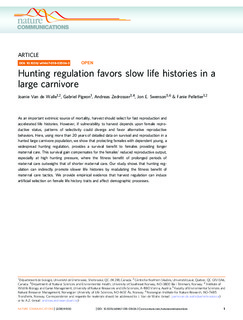| dc.contributor.author | Van de Walle, Joanie | |
| dc.contributor.author | Pigeon, Gabriel | |
| dc.contributor.author | Zedrosser, Andreas | |
| dc.contributor.author | Swenson, Jon | |
| dc.contributor.author | Pelletier, Fanie | |
| dc.date.accessioned | 2019-01-28T09:33:30Z | |
| dc.date.available | 2019-01-28T09:33:30Z | |
| dc.date.created | 2018-03-28T09:36:32Z | |
| dc.date.issued | 2018 | |
| dc.identifier.citation | Nature Communications. 2018, 9. | nb_NO |
| dc.identifier.issn | 2041-1723 | |
| dc.identifier.uri | http://hdl.handle.net/11250/2582552 | |
| dc.description | Open Access This article is licensed under a Creative Commons Attribution 4.0 International License, which permits use, haring, adaptation, distribution and reproduction in any medium or format, as long as you give appropriate credit to the original author(s) and the source, provide a link to the Creative Commons license, and indicate if changes were made. The images or other third party material in this article are included in the article’s Creative Commons license, unless indicated otherwise in a credit line to the material. If material is not included in the article’s Creative Commons license and your intended use is not permitted by statutory regulation or exceeds the permitted use, you will need to obtain permission directly from the copyright holder. | nb_NO |
| dc.description.abstract | As an important extrinsic source of mortality, harvest should select for fast reproduction and accelerated life histories. However, if vulnerability to harvest depends upon female reproductive status, patterns of selectivity could diverge and favor alternative reproductive behaviors. Here, using more than 20 years of detailed data on survival and reproduction in a hunted large carnivore population, we show that protecting females with dependent young, a widespread hunting regulation, provides a survival benefit to females providing longer maternal care. This survival gain compensates for the females’ reduced reproductive output, especially at high hunting pressure, where the fitness benefit of prolonged periods of maternal care outweighs that of shorter maternal care. Our study shows that hunting regulation can indirectly promote slower life histories by modulating the fitness benefit of maternal care tactics. We provide empirical evidence that harvest regulation can induce artificial selection on female life history traits and affect demographic processes. | nb_NO |
| dc.description.abstract | Hunting regulation favors slow life histories in a large carnivore | nb_NO |
| dc.language.iso | eng | nb_NO |
| dc.rights | Navngivelse 4.0 Internasjonal | * |
| dc.rights.uri | http://creativecommons.org/licenses/by/4.0/deed.no | * |
| dc.title | Hunting regulation favors slow life histories in a large carnivore | nb_NO |
| dc.type | Journal article | nb_NO |
| dc.type | Peer reviewed | nb_NO |
| dc.description.version | publishedVersion | nb_NO |
| dc.rights.holder | © The Author(s) 2018 | nb_NO |
| dc.source.pagenumber | 10 | nb_NO |
| dc.source.volume | 9 | nb_NO |
| dc.source.journal | Nature Communications | nb_NO |
| dc.identifier.doi | 10.1038/s41467-018-03506-3 | |
| dc.identifier.cristin | 1576074 | |
| cristin.unitcode | 222,58,1,0 | |
| cristin.unitname | Institutt for natur, helse og miljø | |
| cristin.ispublished | true | |
| cristin.fulltext | original | |
| cristin.qualitycode | 2 | |

